Unit 6 I’m watching TV. Section A(1a-2d)课件(共52张PPT)
文档属性
| 名称 | Unit 6 I’m watching TV. Section A(1a-2d)课件(共52张PPT) | 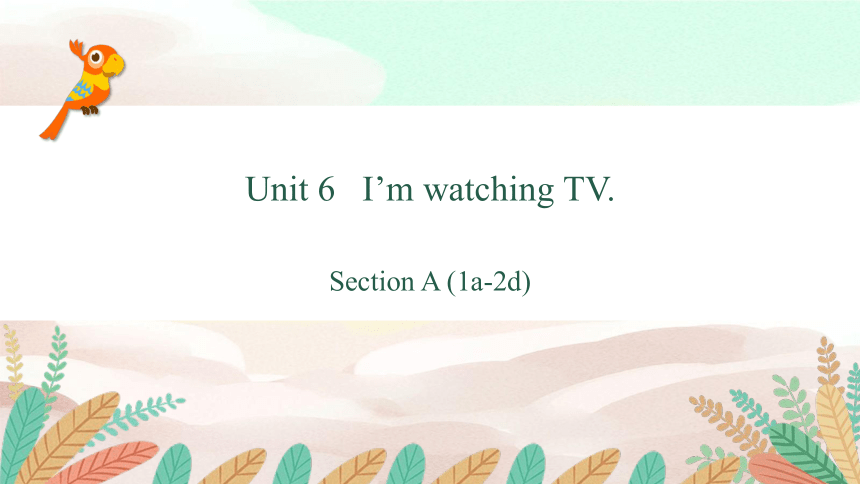 | |
| 格式 | zip | ||
| 文件大小 | 7.0MB | ||
| 资源类型 | 教案 | ||
| 版本资源 | 人教新目标(Go for it)版 | ||
| 科目 | 英语 | ||
| 更新时间 | 2021-04-11 14:48:13 | ||
图片预览

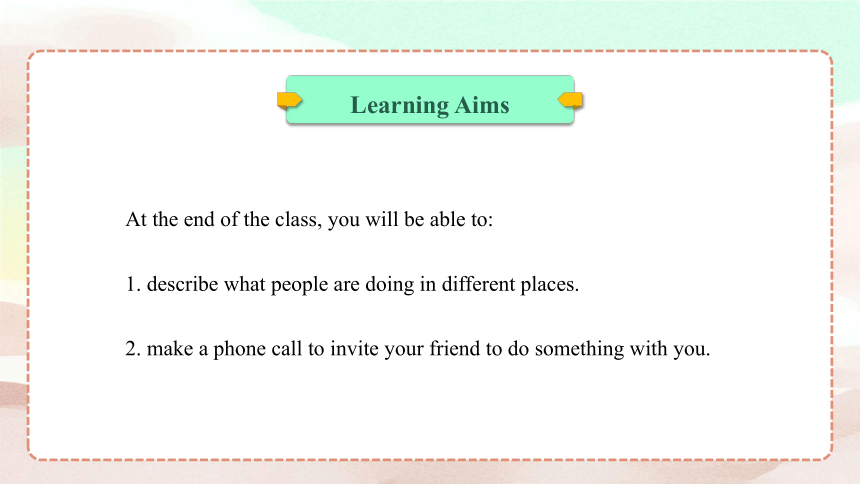
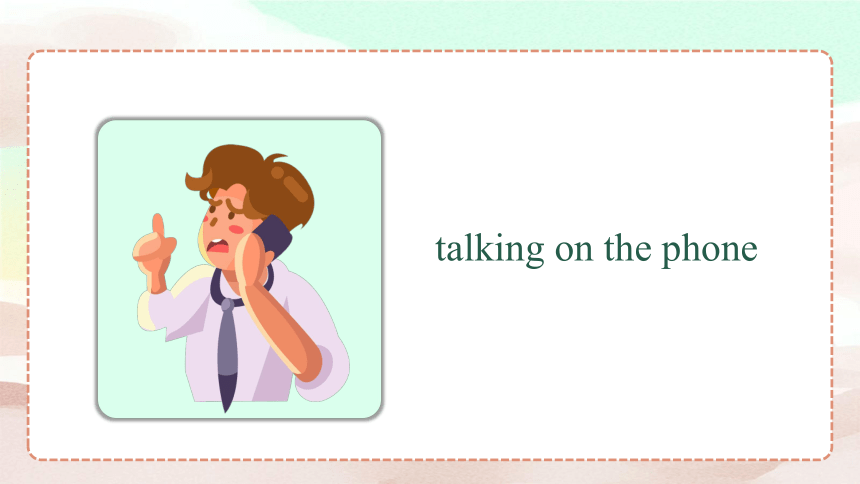
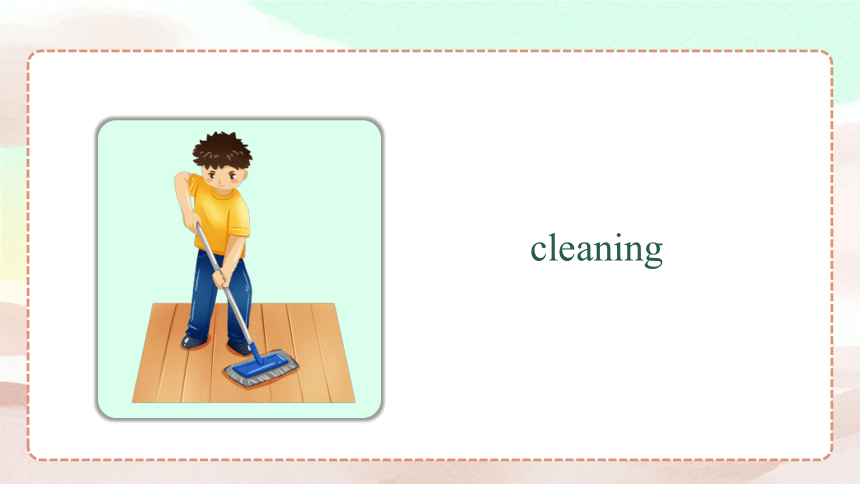
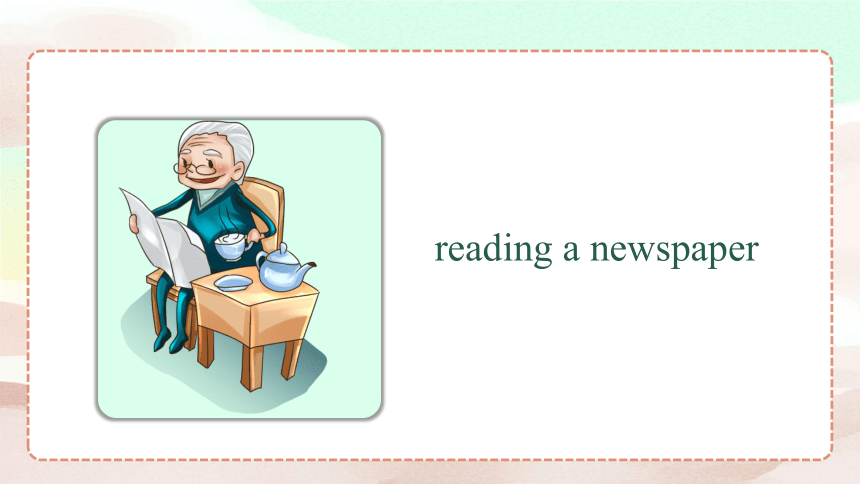
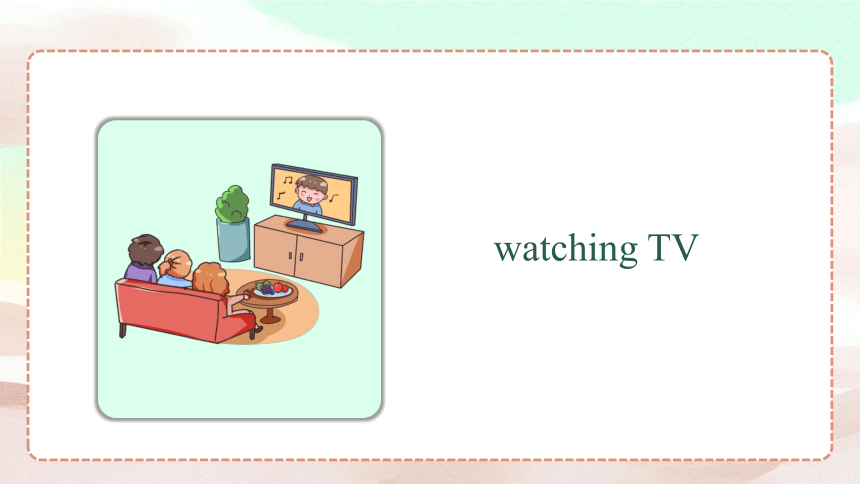
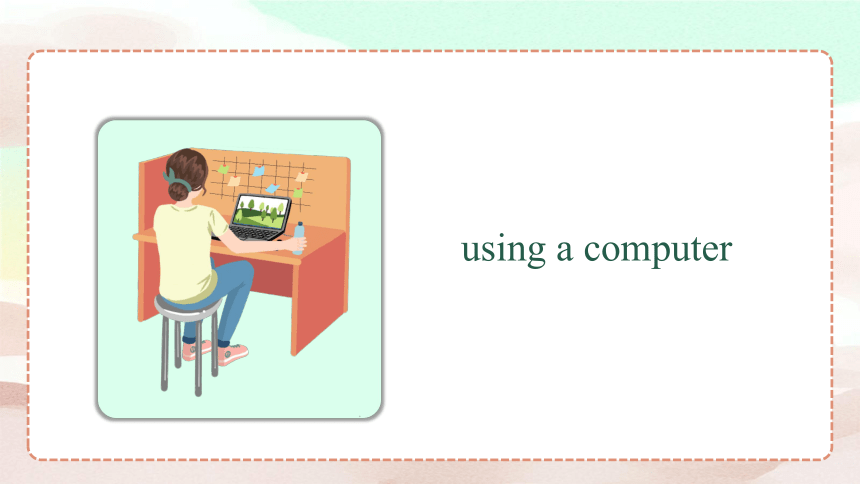
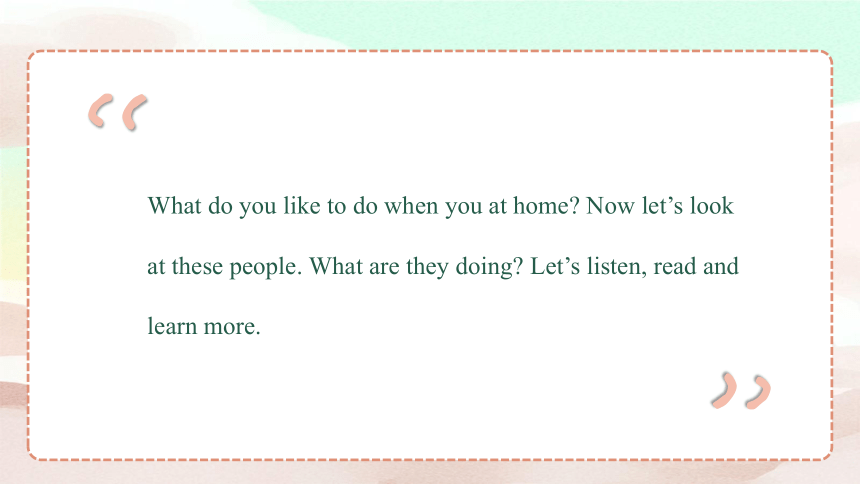
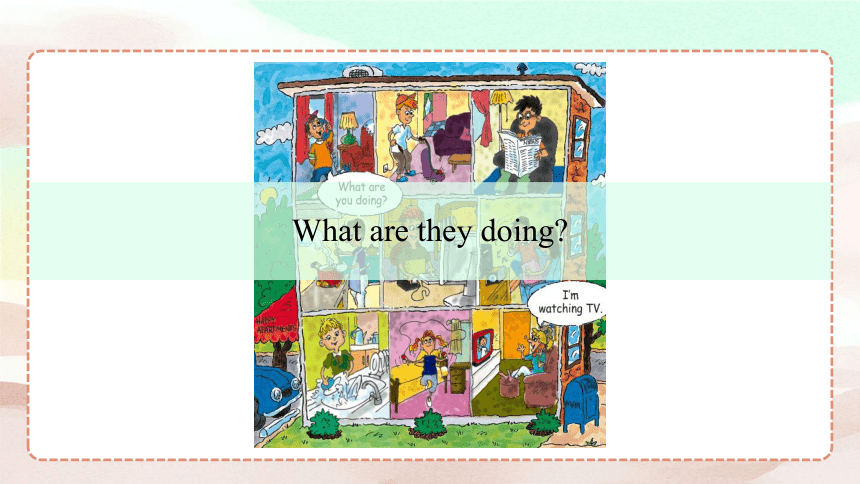
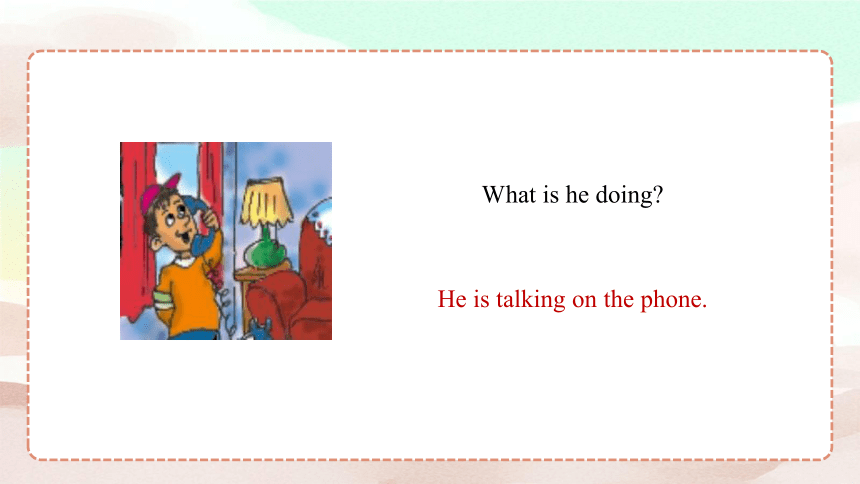
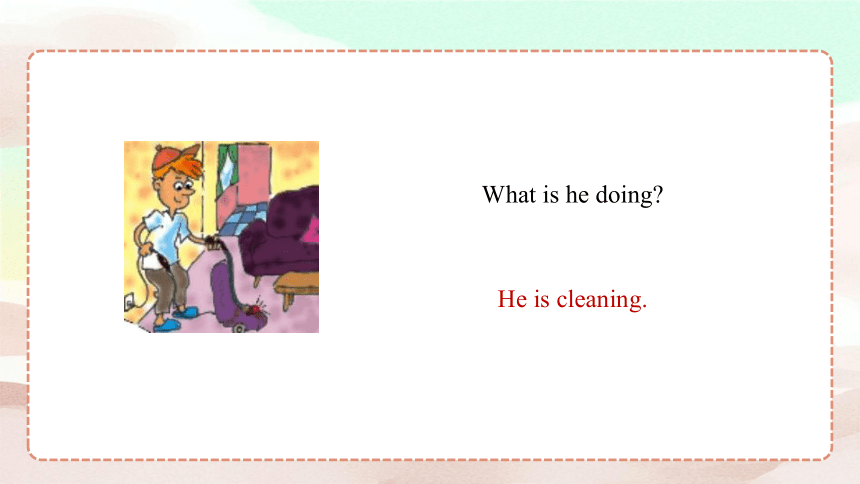
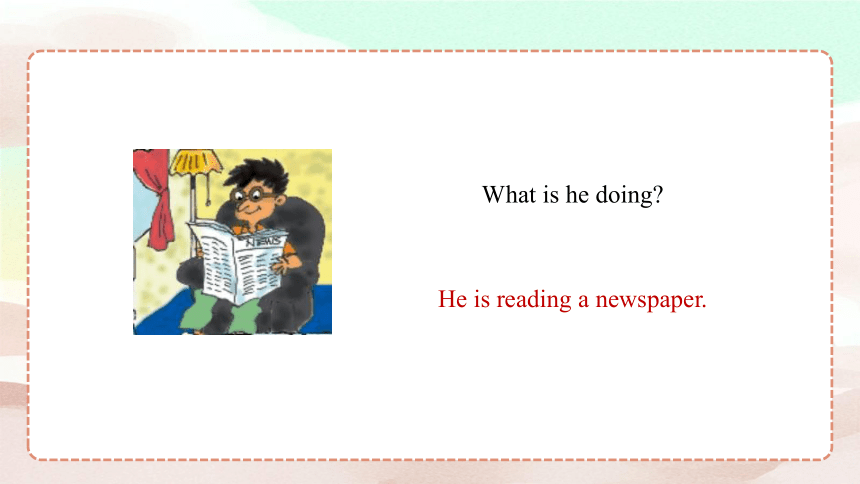
文档简介
(共52张PPT)
Unit
6
I’m
watching
TV.
Section
A
(1a-2d)
Learning
Aims
At
the
end
of
the
class,
you
will
be
able
to:
1.
describe
what
people
are
doing
in
different
places.
2.
make
a
phone
call
to
invite
your
friend
to
do
something
with
you.
talking
on
the
phone
cleaning
reading
a
newspaper
watching
TV
using
a
computer
What
do
you
like
to
do
when
you
at
home?
Now
let’s
look
at
these
people.
What
are
they
doing?
Let’s
listen,
read
and
learn
more.
“
“
What
are
they
doing?
What
is
he
doing?
He
is
talking
on
the
phone.
What
is
he
doing?
He
is
cleaning.
What
is
he
doing?
He
is
reading
a
newspaper.
What
is
he
doing?
He
is
making
soup.
What
is
he
doing?
He
is
using
the
computer.
What
are
they
doing?
They
are
listening
to
a
CD.
What
is
he
doing?
He
is
washing
the
dishes.
What
is
she
doing?
She
is
exercising.
What
is
she
doing?
She
is
watching
TV
and
talking
on
the
phone.
1a
Match
the
activities
with
the
pictures.
1.
watching
TV
2.
cleaning
3.
reading
a
newspaper
4.
talking
on
the
phone
5.
listening
to
a
CD
6.
using
the
computer
7.
making
soup
8.
washing
the
dishes
9.
exercising
i
d
g
a
h
e
b
c
f
Bob
is
talking
to
Jenny
on
the
phone.
What
are
they
talking
about?
Let’s
listen
and
learn
more.
“
“
1.
What
is
Jenny
doing
now?
She
is
watching
TV.
2.
What
is
John
doing
now?
He
is
washing
the
dishes.
3.
What
are
Dave
and
Mary
doing
now?
They
are
listening
to
a
CD.
Listen
and
answer
the
questions.
Make
conversations
with
the
picture
in
1a.
Example:
A:
What
is
Bob
doing?
B:
He
is
talking
on
the
phone.
A:
What
is
John
doing?
B:
He
is
washing
the
dishes.
reading
a
newspaper
看报纸
newspaper
可数名词,意为“报纸”。
e.g.
My
grandpa
reads
newspapers
every
morning.
paper
不可数名词,意为“纸;纸张”;可数名词,意为“试卷;卷子”。
e.g.
There
is
some
paper
on
the
ground.
Cindy
is
helping
the
teacher
give
out
the
test
papers.
【注意】paper(纸;纸张)前不能直接用数词,需借助piece(s)
of来表达其数量。
e.g.
a
piece
of
paper
一张纸
five
pieces
of
paper
五张纸
He’s
using
the
computer.
他正在使用电脑。
use
动词,意为“使用;运用”,
using为其现在分词形式。
常用搭配:
1.
use...
to
do
sth.
用……去做……
e.g.
Can
you
use
the
new
tape
recorder?
2.
use
up
用完;用光
e.g.
aDon’t
use
up
all
the
soap.
1.
use还可作名词,意为“使用;用途”。
e.g.
The
use
of
the
telephone
is
growing
rapidly.
2.
词形变化:
use
(n.
使用)→useful
adj.有用的→useless
adj.无用的
Activities
having
class
cleaning
the
classroom
cleaning
the
blackboard
running
playing
basketball
playing
soccer
Activities
talking
on
the
phone
reading
a
newspaper
watching
TV
washing
clothes
washing
the
dishes
cooking
Activities
jogging
taking
a
walk
flying
a
kite
doing
exercise
riding
a
bike
having
a
picnic
Listen!
Steven
and
Jack
are
talking
on
the
phone.
What
are
they
talking
about?
Let’s
listen
and
learn
more.
“
“
2a.
Listen
and
match
the
answers
with
the
questions.
1.
What
is
Steve
doing?
2.
What
is
Jack
doing?
a.
He
is
watching
TV.
b.
He
is
listening
to
a
CD.
2b.Listen
again
and
fill
in
the
blanks.
Jack:
Hello,
Steve.
Steve:
Hi,
Jack.
Jack:
What
you
,
Steve?
Steve:
I’m
.
What
about
you?
Jack:
I’m
,
but
it’s
kind
of
.
Steve:
Yeah,
my
TV
show
is
also
not
very
.
Do
you
want
to
the
movies?
Jack:
That
sounds
good.
are
doing
watching
TV
listening
to
a
CD
boring
interesting
go
to
Do
you
want
to
go
to
the
movies?
你想去看电影吗?
go
to
the
movies“去看电影”,为美国英语常用语。英国英语通常用go
to
the
cinema。
1.
go后接活动性名词,表示“去做某事”。
go
to
the
party
去参加聚会
go
to
the
meeting
去开会
go
to
the
match
去看比赛
go
to
the
talk
去听报告会
2.
go后加v.-ing形式,表示“去进行这一活动”。
go
shopping
去购物
go
swimming
去游泳
go
fishing
去钓鱼
go
climbing
去爬山
Role-play
the
conversation
in
2b
with
your
partner.
Jack:
Hello,
Steve.
Steve:
Hi,
Jack.
Jack:
What
are
you
doing,
Steve?
Steve:
I’m
…
Look!
Jenny
is
talking
on
the
phone.
Who
is
she
talking
to?
Let’s
listen,
read
and
learn
more.
“
“
Listen
and
answer
the
questions.
What
is
Laura
doing?
2.
What
is
Jenny
doing?
3.
What
does
Jenny
want
to
do?
She
is
washing
her
clothes.
She
is
watching
TV.
She
wants
to
eat
out
for
dinner
with
Laura.
2d.
Role-play
the
conversation.
Jenny:
Hello?
This
is
Jenny.
Laura:
Hi,
Jenny.
It’s
Laura
here.
Jenny:
Oh,
hi,
Laura.
What
are
you
doing?
Laura:
Not
much.
I’m
just
washing
my
clothes.
What
about
you?
Jenny:
I’m
watching
TV.
Do
you
want
to
join
me
for
dinner?
My
parents
aren’t
at
home.
We
can
eat
out.
Laura:
Yeah.
I’d
love
to.
Jenny:
Let’s
meet
at
my
home
first.
Come
at
half
past
six.
Laura:
OK.
See
you
then.
This
is
Jenny.
我是珍妮。
本句在此为打电话用语,相当于“This
is
Jenny
speaking.”。
在英语习惯中,打电话时一般用this表示“我”,用that表示“对方”,而不是用“I”或“you”。
e.g.
—Hi,
this
is
Peter
speaking.
Who’s
that?
—Hi,
Peter.
This
is
Eric.
打电话常用语小结
拨打电话
1.
Could/May
I
speak
to...?
2.
Is
that
/
this...
(speaking)?
接听电话
1.
This
is...(speaking).
2.
Who’s
that(speaking)?
3.
This
is
the
wrong
number.
4.
It’s...here我是……
打电话常用语小结
留言或请对方稍候
1.
May/Could
I
leave
a
message?
2.
Hold
on
(for
a
minute),
please.
线路故障或听不清楚
1.
The
line
is
bad.
2.
Would
you
speak
up,
please?
【注意】当问对方是谁时,英语中不用“Who
are
you?”,而用“Who’s
that?”。如果问对方“是……
吗?”,不用“Are
you...?”,而要用“Is
that...?”。
Not
much.
没做什么。
not
much在此意为“没做什么”,相当于nothing
much(不忙什么;没什么事),多用于日常交际用语中。
e.g.
—What
are
you
doing
this
weekend?
—Not
much.
I’m
just
washing
my
clothes.
我只是在洗我的衣服。
just此处用作副词,意为“只是;恰好”,常用于现在进行时和一般现在时。
e.g.
I
just
want
to
tell
you
I
am
wrong.
1.
just用作副词,还可意为“刚才,刚刚”。
e.g.
I’m
just
out
of
hospital.
2.
just常用短语:
just
now
刚才;
just
then
就在那时
I’d
love
to.
我很乐意。
I’d
love
to经常用于礼貌地接受他人邀请,还可以说成I’d
like
to,但是语气较前者稍弱。
e.g.
—Would
you
like
to
come
with
us
to
the
show?
—Thanks.
I’d
like
to.
当婉言拒绝他人邀请时,多用I’d
love
to,
but...或Sorry,
I’m
afraid
I
can’t
because...等。
e.g.
—I’m
going
to
town.
Would
you
like
to
join
me?
—Sorry,
I’m
afraid
I
can’t
because
I
have
much
homework
to
do.
Activities:
read
a
newspaper,
watch
TV,
talk
on
the
phone…
What
is
she/he
doing?
He
is
watching
TV.
She
is
talking
on
the
phone.
…
根据所给汉语提示完成句子
1.
My
grandfather
likes
reading
a
____________(报纸)
after
breakfast.
2.
I
like
the
tomato
________(汤).
It
tastes
good.
3.
My
mother
________(洗)
clothes
every
day.
4.
I
like
this
________(电影),
and
my
mother
likes
it
too.
5.
This
jacket
is
________(恰好)
my
size.
So
I
want
to
take
it.
newspaper
soup
washes
movie
just
单项选择
(
)1.
—I’m
thirsty.
Please
give
me
some
______.
—OK.
Here
you
are.
A.
bread
B.
tea
C.
rice
D.
bananas
(
)2.
She
often
goes
to
the
library
because
she
likes
to
______
books
and
magazines.
A.
look
B.
see
C.
watch
D.
read
(
)3.
Listen!
Someone
_______
for
help!
Let’s
go
to
see
it.
A.
calls
B.
calling
C.
is
calling
D.
call
(
)4.—
_____
you______
a
book?
—Yes,
I
am.
A.
Do;
read
B.
Are;
read
C.
Are;
reading
D.
Are;
looking
(
)5.
—_______
are
you
doing
over
there?
—I’m
waiting
for
Mary.
A.
Who
B.
When
C.
What
D.
Where
B
D
C
C
C
根据汉语提示完成句子
1.布朗先生正在树下读一张报纸。
Mr
Brown
a
under
the
tree.
2.你姐姐正在厨房里洗碗吗?
your
sister
the
in
the
kitchen?
3.杰克正在和他的同学打电话。
Jack
the
phone
with
his
classmate.
4.今天晚上你想和我们一起去看电影吗?
Do
you
want
to
the
with
us
this
evening?
5.看!
爸爸不在用电脑。咱们用一下电脑吧。
Look!
Dad
the
.
Let’s
use
it.
is
reading
newspaper
Is
washing
dishes
is
talking
on
go
to
movies
isn’t
using
computer
1.Role-play
the
conversation
in
2d.
2.Ask
what
your
friend
is
doing
now.
Unit
6
I’m
watching
TV.
Section
A
(1a-2d)
Learning
Aims
At
the
end
of
the
class,
you
will
be
able
to:
1.
describe
what
people
are
doing
in
different
places.
2.
make
a
phone
call
to
invite
your
friend
to
do
something
with
you.
talking
on
the
phone
cleaning
reading
a
newspaper
watching
TV
using
a
computer
What
do
you
like
to
do
when
you
at
home?
Now
let’s
look
at
these
people.
What
are
they
doing?
Let’s
listen,
read
and
learn
more.
“
“
What
are
they
doing?
What
is
he
doing?
He
is
talking
on
the
phone.
What
is
he
doing?
He
is
cleaning.
What
is
he
doing?
He
is
reading
a
newspaper.
What
is
he
doing?
He
is
making
soup.
What
is
he
doing?
He
is
using
the
computer.
What
are
they
doing?
They
are
listening
to
a
CD.
What
is
he
doing?
He
is
washing
the
dishes.
What
is
she
doing?
She
is
exercising.
What
is
she
doing?
She
is
watching
TV
and
talking
on
the
phone.
1a
Match
the
activities
with
the
pictures.
1.
watching
TV
2.
cleaning
3.
reading
a
newspaper
4.
talking
on
the
phone
5.
listening
to
a
CD
6.
using
the
computer
7.
making
soup
8.
washing
the
dishes
9.
exercising
i
d
g
a
h
e
b
c
f
Bob
is
talking
to
Jenny
on
the
phone.
What
are
they
talking
about?
Let’s
listen
and
learn
more.
“
“
1.
What
is
Jenny
doing
now?
She
is
watching
TV.
2.
What
is
John
doing
now?
He
is
washing
the
dishes.
3.
What
are
Dave
and
Mary
doing
now?
They
are
listening
to
a
CD.
Listen
and
answer
the
questions.
Make
conversations
with
the
picture
in
1a.
Example:
A:
What
is
Bob
doing?
B:
He
is
talking
on
the
phone.
A:
What
is
John
doing?
B:
He
is
washing
the
dishes.
reading
a
newspaper
看报纸
newspaper
可数名词,意为“报纸”。
e.g.
My
grandpa
reads
newspapers
every
morning.
paper
不可数名词,意为“纸;纸张”;可数名词,意为“试卷;卷子”。
e.g.
There
is
some
paper
on
the
ground.
Cindy
is
helping
the
teacher
give
out
the
test
papers.
【注意】paper(纸;纸张)前不能直接用数词,需借助piece(s)
of来表达其数量。
e.g.
a
piece
of
paper
一张纸
five
pieces
of
paper
五张纸
He’s
using
the
computer.
他正在使用电脑。
use
动词,意为“使用;运用”,
using为其现在分词形式。
常用搭配:
1.
use...
to
do
sth.
用……去做……
e.g.
Can
you
use
the
new
tape
recorder?
2.
use
up
用完;用光
e.g.
aDon’t
use
up
all
the
soap.
1.
use还可作名词,意为“使用;用途”。
e.g.
The
use
of
the
telephone
is
growing
rapidly.
2.
词形变化:
use
(n.
使用)→useful
adj.有用的→useless
adj.无用的
Activities
having
class
cleaning
the
classroom
cleaning
the
blackboard
running
playing
basketball
playing
soccer
Activities
talking
on
the
phone
reading
a
newspaper
watching
TV
washing
clothes
washing
the
dishes
cooking
Activities
jogging
taking
a
walk
flying
a
kite
doing
exercise
riding
a
bike
having
a
picnic
Listen!
Steven
and
Jack
are
talking
on
the
phone.
What
are
they
talking
about?
Let’s
listen
and
learn
more.
“
“
2a.
Listen
and
match
the
answers
with
the
questions.
1.
What
is
Steve
doing?
2.
What
is
Jack
doing?
a.
He
is
watching
TV.
b.
He
is
listening
to
a
CD.
2b.Listen
again
and
fill
in
the
blanks.
Jack:
Hello,
Steve.
Steve:
Hi,
Jack.
Jack:
What
you
,
Steve?
Steve:
I’m
.
What
about
you?
Jack:
I’m
,
but
it’s
kind
of
.
Steve:
Yeah,
my
TV
show
is
also
not
very
.
Do
you
want
to
the
movies?
Jack:
That
sounds
good.
are
doing
watching
TV
listening
to
a
CD
boring
interesting
go
to
Do
you
want
to
go
to
the
movies?
你想去看电影吗?
go
to
the
movies“去看电影”,为美国英语常用语。英国英语通常用go
to
the
cinema。
1.
go后接活动性名词,表示“去做某事”。
go
to
the
party
去参加聚会
go
to
the
meeting
去开会
go
to
the
match
去看比赛
go
to
the
talk
去听报告会
2.
go后加v.-ing形式,表示“去进行这一活动”。
go
shopping
去购物
go
swimming
去游泳
go
fishing
去钓鱼
go
climbing
去爬山
Role-play
the
conversation
in
2b
with
your
partner.
Jack:
Hello,
Steve.
Steve:
Hi,
Jack.
Jack:
What
are
you
doing,
Steve?
Steve:
I’m
…
Look!
Jenny
is
talking
on
the
phone.
Who
is
she
talking
to?
Let’s
listen,
read
and
learn
more.
“
“
Listen
and
answer
the
questions.
What
is
Laura
doing?
2.
What
is
Jenny
doing?
3.
What
does
Jenny
want
to
do?
She
is
washing
her
clothes.
She
is
watching
TV.
She
wants
to
eat
out
for
dinner
with
Laura.
2d.
Role-play
the
conversation.
Jenny:
Hello?
This
is
Jenny.
Laura:
Hi,
Jenny.
It’s
Laura
here.
Jenny:
Oh,
hi,
Laura.
What
are
you
doing?
Laura:
Not
much.
I’m
just
washing
my
clothes.
What
about
you?
Jenny:
I’m
watching
TV.
Do
you
want
to
join
me
for
dinner?
My
parents
aren’t
at
home.
We
can
eat
out.
Laura:
Yeah.
I’d
love
to.
Jenny:
Let’s
meet
at
my
home
first.
Come
at
half
past
six.
Laura:
OK.
See
you
then.
This
is
Jenny.
我是珍妮。
本句在此为打电话用语,相当于“This
is
Jenny
speaking.”。
在英语习惯中,打电话时一般用this表示“我”,用that表示“对方”,而不是用“I”或“you”。
e.g.
—Hi,
this
is
Peter
speaking.
Who’s
that?
—Hi,
Peter.
This
is
Eric.
打电话常用语小结
拨打电话
1.
Could/May
I
speak
to...?
2.
Is
that
/
this...
(speaking)?
接听电话
1.
This
is...(speaking).
2.
Who’s
that(speaking)?
3.
This
is
the
wrong
number.
4.
It’s...here我是……
打电话常用语小结
留言或请对方稍候
1.
May/Could
I
leave
a
message?
2.
Hold
on
(for
a
minute),
please.
线路故障或听不清楚
1.
The
line
is
bad.
2.
Would
you
speak
up,
please?
【注意】当问对方是谁时,英语中不用“Who
are
you?”,而用“Who’s
that?”。如果问对方“是……
吗?”,不用“Are
you...?”,而要用“Is
that...?”。
Not
much.
没做什么。
not
much在此意为“没做什么”,相当于nothing
much(不忙什么;没什么事),多用于日常交际用语中。
e.g.
—What
are
you
doing
this
weekend?
—Not
much.
I’m
just
washing
my
clothes.
我只是在洗我的衣服。
just此处用作副词,意为“只是;恰好”,常用于现在进行时和一般现在时。
e.g.
I
just
want
to
tell
you
I
am
wrong.
1.
just用作副词,还可意为“刚才,刚刚”。
e.g.
I’m
just
out
of
hospital.
2.
just常用短语:
just
now
刚才;
just
then
就在那时
I’d
love
to.
我很乐意。
I’d
love
to经常用于礼貌地接受他人邀请,还可以说成I’d
like
to,但是语气较前者稍弱。
e.g.
—Would
you
like
to
come
with
us
to
the
show?
—Thanks.
I’d
like
to.
当婉言拒绝他人邀请时,多用I’d
love
to,
but...或Sorry,
I’m
afraid
I
can’t
because...等。
e.g.
—I’m
going
to
town.
Would
you
like
to
join
me?
—Sorry,
I’m
afraid
I
can’t
because
I
have
much
homework
to
do.
Activities:
read
a
newspaper,
watch
TV,
talk
on
the
phone…
What
is
she/he
doing?
He
is
watching
TV.
She
is
talking
on
the
phone.
…
根据所给汉语提示完成句子
1.
My
grandfather
likes
reading
a
____________(报纸)
after
breakfast.
2.
I
like
the
tomato
________(汤).
It
tastes
good.
3.
My
mother
________(洗)
clothes
every
day.
4.
I
like
this
________(电影),
and
my
mother
likes
it
too.
5.
This
jacket
is
________(恰好)
my
size.
So
I
want
to
take
it.
newspaper
soup
washes
movie
just
单项选择
(
)1.
—I’m
thirsty.
Please
give
me
some
______.
—OK.
Here
you
are.
A.
bread
B.
tea
C.
rice
D.
bananas
(
)2.
She
often
goes
to
the
library
because
she
likes
to
______
books
and
magazines.
A.
look
B.
see
C.
watch
D.
read
(
)3.
Listen!
Someone
_______
for
help!
Let’s
go
to
see
it.
A.
calls
B.
calling
C.
is
calling
D.
call
(
)4.—
_____
you______
a
book?
—Yes,
I
am.
A.
Do;
read
B.
Are;
read
C.
Are;
reading
D.
Are;
looking
(
)5.
—_______
are
you
doing
over
there?
—I’m
waiting
for
Mary.
A.
Who
B.
When
C.
What
D.
Where
B
D
C
C
C
根据汉语提示完成句子
1.布朗先生正在树下读一张报纸。
Mr
Brown
a
under
the
tree.
2.你姐姐正在厨房里洗碗吗?
your
sister
the
in
the
kitchen?
3.杰克正在和他的同学打电话。
Jack
the
phone
with
his
classmate.
4.今天晚上你想和我们一起去看电影吗?
Do
you
want
to
the
with
us
this
evening?
5.看!
爸爸不在用电脑。咱们用一下电脑吧。
Look!
Dad
the
.
Let’s
use
it.
is
reading
newspaper
Is
washing
dishes
is
talking
on
go
to
movies
isn’t
using
computer
1.Role-play
the
conversation
in
2d.
2.Ask
what
your
friend
is
doing
now.
同课章节目录
- Unit 1 Can you play the guitar?
- Section A
- Section B
- Unit 2 What time do you go to school?
- Section A
- Section B
- Unit 3 How do you get to school?
- Section A
- Section B
- Unit 4 Don't eat in class.
- Section A
- Section B
- Unit 5 Why do you like pandas?
- Section A
- Section B
- Unit 6 I'm watching TV.
- Section A
- Section B
- Review of Units 1-6
- Unit 7 It's raining!
- Section A
- Section B
- Unit 8 Is there a post office near here?
- Section A
- Section B
- Unit 9 What does he look like?
- Section A
- Section B
- Unit 10 I'd like some noodles.
- Section A
- Section B
- Unit 11 How was your school trip?
- Section A
- Section B
- Unit 12 What did you do last weekend?
- Section A
- Section B
